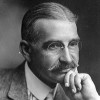“ of the people who exceed, he who exceeds in fearlessness has no name (many of the states have no name) , while the man who exceeds in confidence is rash, and he who exceeds in fear and falls short in confidence is a coward. ”
Aristotle, Nicomachean Ethics (c. 334 BC - 330 BC). copy citation
| Author | Aristotle |
|---|---|
| Source | Nicomachean Ethics |
| Topic | fearlessness fear |
| Date | c. 334 BC - 330 BC |
| Language | English |
| Reference | |
| Note | Translated by W. D. Ross |
| Weblink | http://classics.mit.edu/Aristotle/nicomachaen.mb.txt |
Context
“For among statements about conduct those which are general apply more widely, but those which are particular are more genuine, since conduct has to do with individual cases, and our statements must harmonize with the facts in these cases. We may take these cases from our table. With regard to feelings of fear and confidence courage is the mean; of the people who exceed, he who exceeds in fearlessness has no name (many of the states have no name) , while the man who exceeds in confidence is rash, and he who exceeds in fear and falls short in confidence is a coward. With regard to pleasures and pains- not all of them, and not so much with regard to the pains- the mean is temperance, the excess self-indulgence. Persons deficient with regard to the pleasures are not often found;”
source


